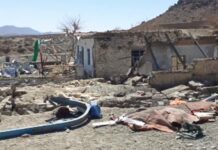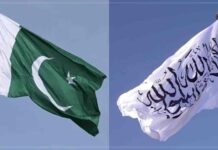Islamabad: Pakistani authorities tonight stopped ‘Baloch Long March’, launched in Balochistan 6 days back, from reaching its destination Islamabad, prompting the organisers to urge the UN to send a Fact-Finding team to assess the extent of Pakistani oppression against the Baloch people.
The participants of the march, including mostly women and elderly kin of the victims of ‘Enforced Disappearances’ and extrajudicial killings in occupied Balochistan, were stopped on the outskirts of Islamabad by thousands of security personnel.
Mahrang Baloch, a prominent Baloch activist and leader of the march, said they intended to end their peaceful march at Islamabad Press Club and questioned the authorities why they were not being allowed to do so.
She said the participants only wanted to highlight their grievances in front of Pakistani and international press at the Press Club.
However, the authorities refused to allow them to proceed, following which the participants picked the road there itself.
Later, in a video message, she said the campaign represented by the long march will not end.
She said the Pakistani authorities had tried to disrupt the long march earlier also at various places through which it passed.
A number of participants were arrested and cases lodged against them, she said and demanded their immediate release along with those picked up earlier.
She urged the UN to send a Fact-Finding team to Balochistan to see how people there are facing torture, oppression and human rights violations every day.
The march, being undertaken under the banner of Baloch Yakjehti Committee (BYC), started in Kech, bordering Iran and was to culminate in Islamabad after covering a distance of 1600 kms.
Fed up with continued oppression by the occupying Pakistani forces in Balochistan, the people from the region, including many women, launched the massive non-violent campaign to amplify their decades-old grievances related to extreme human rights violations.
Lakhs of people participated in the peaceful march.
The Pakistani forces have been indulging in extreme forms of atrocities and oppression against the Baloch people in a bid to maintain illegal occupation of Balochistan in the face of a sustained struggle for Independence from the locals.
Balochistan was illegally occupied by Pakistan in 1948 and a sustained uprising has been going on there for independence.
As part of their unsuccessful efforts to douse the mass sentiment for freedom in Balochistan, the Pakistani forces frequently kill innocent locals in fake encounters and illegally pick up youth whose whereabouts are never known thereafter under a dreaded practice described as ‘Enforced Disappearances’.
Over the several decades, tens of thousands of Baloch people, including youth, women and children, have been the victims of this inhuman practice of ‘Enforced Disappearances’.
While their loved ones keep waiting endlessly, the victims of ‘enforced disappearances’ are never found again. Even when they are killed in illegal custody, their bodies are rarely handed over to their kin.
The latest long-march was triggered by the bizarre inhuman act by the Pakistani forces last month when they tied 3 children to a vehicle and blew it up with an bomb.
The Pakistani State has been trying to scuttle the long-march through various means, including by using force and spreading negative propaganda against the Baloch people and the participants of the march.
Two days back, the Pakistani security forces tried to stop the march in Dera Ghazi Khan in Punjab Province by using force and detaining 20 key participants.
The detained people were released later but cases were filed against them.
This action invited the condemnation by the Amnesty International, the global human rights group, which demanded immediate dropping of all charges against those booked.
The Amnesty International also demanded an impartial investigation into all the extra-judicial killings and enforced disappearances in Balochistan “in line with international standards”.
It also demanded compensation for the families of the victims of extrajudicial killings and those forcibly disappeared.








